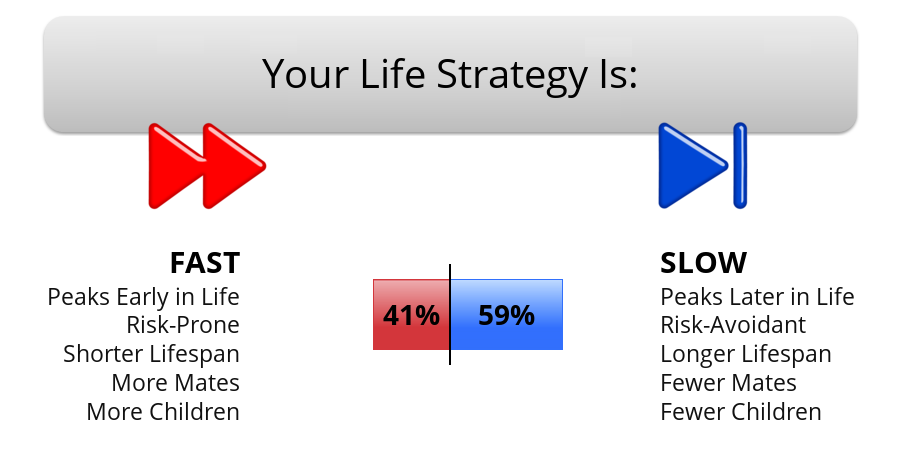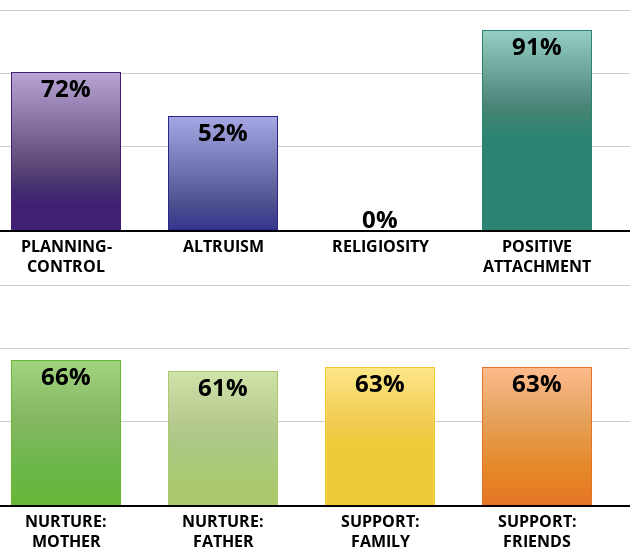Luminous
༻✧✧༺
- Joined
- Oct 25, 2017
- Messages
- 10,196
- MBTI Type
- Iᑎᖴᑭ
- Enneagram
- 952
- Instinctual Variant
- sx/sp
https://www.idrlabs.com/pace-of-life/test.php
Life Strategy: Reflects your place on the fast/slow pace of life continuum in relation to life choices and behavioral strategies.
Slow Life Strategy is associated with a longer lifespan, sympathetic and predictable early-life conditions, later sexual maturation, delayed reproduction, lower mating effort, and more parenting effort with a smaller number of offspring. A slow life history thus reflects a tendency toward an adaptive interpersonal style, mature emotional functioning and awareness, secure attachments, self-control, prosocial behavior, and relationship stability.
Fast Life Strategy is associated with a shorter life span, harsh and unpredictable childhood conditions, early sexual maturity, early reproduction, promiscuity, and less parenting effort with a larger number of offspring. A fast life history denotes a tendency toward interpersonal distrustfulness, maladaptive emotional functioning and awareness, insecure attachments, impulsivity, self-interested behavior, and instability in relationships.
Planning-Control: Indicates your tendency to engage in reflective cognition in order to sustain effortful and adaptive psychosocial resource investment.
Altruism: Reflects motivation to increase the welfare of others.
Religiosity: Denotes religious tendencies and commitment to religious beliefs.
Positive Attachment: Reflects attachment security in romantic relationships.
Nurture: Mother: Indicates the quality of your childhood relationship with your biological mother.
Nurture: Father: Indicates the quality of your childhood relationship with your biological father.
Support: Family: Indicates the quality of support you derive from your family.
Support: Friends: Indicates the quality of support you derive from your friends.

Explanation of Terms:
Life Strategy: Reflects your place on the fast/slow pace of life continuum in relation to life choices and behavioral strategies.
Slow Life Strategy is associated with a longer lifespan, sympathetic and predictable early-life conditions, later sexual maturation, delayed reproduction, lower mating effort, and more parenting effort with a smaller number of offspring. A slow life history thus reflects a tendency toward an adaptive interpersonal style, mature emotional functioning and awareness, secure attachments, self-control, prosocial behavior, and relationship stability.
Fast Life Strategy is associated with a shorter life span, harsh and unpredictable childhood conditions, early sexual maturity, early reproduction, promiscuity, and less parenting effort with a larger number of offspring. A fast life history denotes a tendency toward interpersonal distrustfulness, maladaptive emotional functioning and awareness, insecure attachments, impulsivity, self-interested behavior, and instability in relationships.
Planning-Control: Indicates your tendency to engage in reflective cognition in order to sustain effortful and adaptive psychosocial resource investment.
Altruism: Reflects motivation to increase the welfare of others.
Religiosity: Denotes religious tendencies and commitment to religious beliefs.
Positive Attachment: Reflects attachment security in romantic relationships.
Nurture: Mother: Indicates the quality of your childhood relationship with your biological mother.
Nurture: Father: Indicates the quality of your childhood relationship with your biological father.
Support: Family: Indicates the quality of support you derive from your family.
Support: Friends: Indicates the quality of support you derive from your friends.





